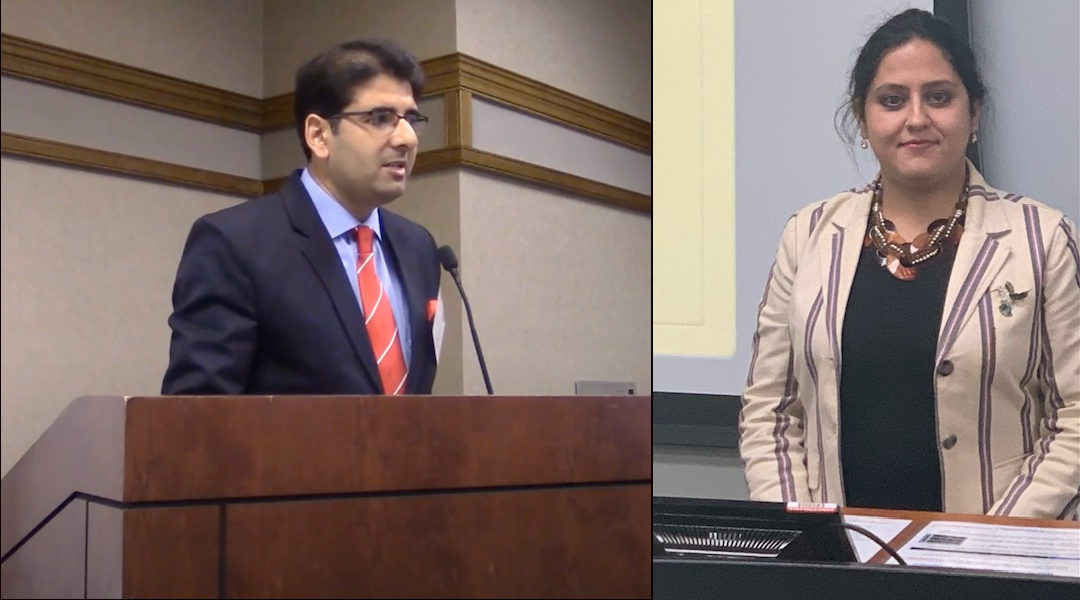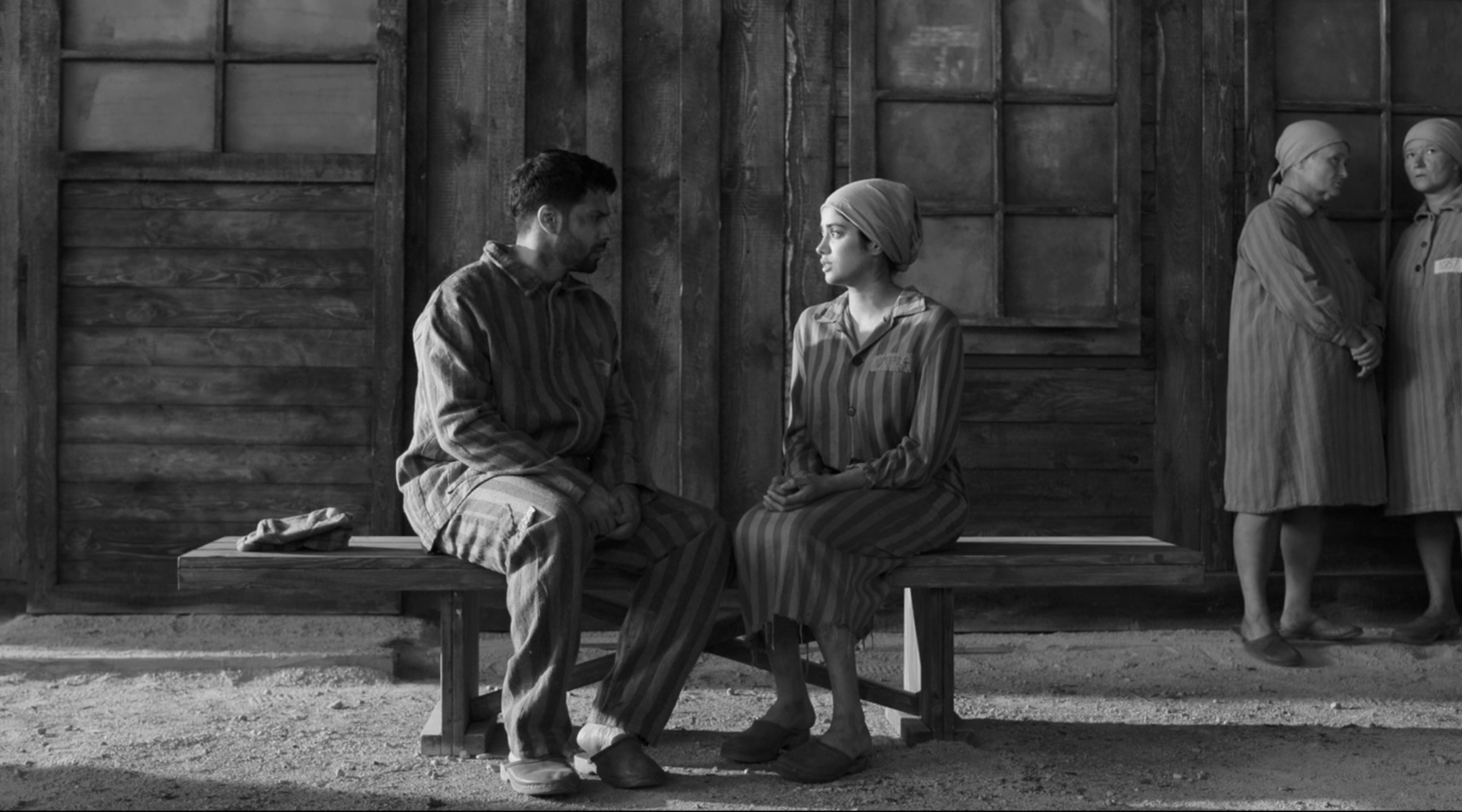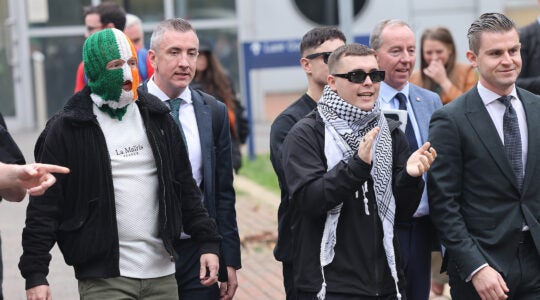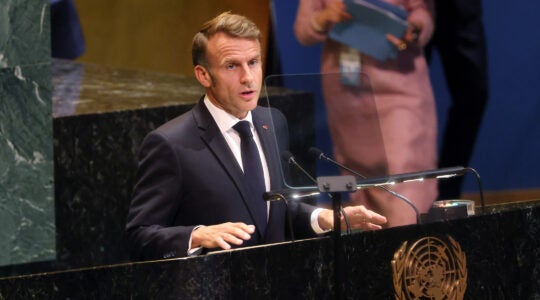(JTA) – Mehak Burza is the first to admit that the state of Holocaust awareness in India is abysmal.
“You will not get a very positive response on this,” she said with a laugh.
Indian schoolchildren are taught next to nothing about the events of the Holocaust, and what does make it to textbooks does not mention Jews, Burza said. Public opinion on Hitler ranges from neutral to positive, with politicians, TV characters, and businesses having adopted his name and dress as aspirational symbols over the past few years.
“They always see the Holocaust as an alien event,” Burza, who teaches English literature at several universities in New Delhi, told the Jewish Telegraphic Agency.
All of that, Burza said, is why — despite some serious reservations — she is pleased with the new Bollywood movie “Bawaal,” which follows a conceited history teacher as he learns about the events of the Holocaust while trying to repair his strained relationship with his wife. The movie, which debuted on Amazon Prime two weeks ago, tracks its protagonists Ajay and Nisha as they visit European World War II sites of note, including the beaches of Normandy, Anne Frank’s house in Amsterdam, Hitler’s bunker in Berlin and the Auschwitz death camps.
“Bawaal” has been heavily criticized both by people who happened to tune into the movie and also by Jewish groups like the Simon Wiesenthal Center, which objects to the characters in the film’s climax imagining themselves as Jewish prisoners of the camp. The film is rife with historical inaccuracies and barely mentions Jews; it also has lines of dialogue that Burza admits are deeply offensive and off-putting. In the most egregious example, one actor playing an Auschwitz survivor tells the protagonists, “Every relationship has its own Auschwitz.”
When Burza heard that line, “I had to pause the movie and go and get a breath of fresh air,” she said. “You’re trivializing Auschwitz with your marriage!”
Yet Burza, who is also the head of Holocaust studies at the Global Center for Religious Research, still thinks “Bawaal” is a positive start to the subject that will encourage many Indians to do further research into the Holocaust.
“Being the first Bollywood movie to take up this issue is very, very challenging, and a very big step for an Indian audience,” she said. “As a Holocaust scholar, I can point out hundreds of mistakes in the movie. But as a first-time audience, I see, OK, it’s a welcome step to those who don’t even know anything at all.
“The only disappointing thing that quite irritated me throughout the movie,” she added with a laugh, “was the pronunciation of ‘Auschwitz.’” (In the movie, the characters make it sound like “office.”)
Born and educated in the capital of New Delhi, Burza came to the subject of Holocaust scholarship while studying to become a medical doctor, after an interest in trauma narratives kept drawing her to memoirs by survivors. Switching her studies to English literature, she focused her thesis on the breakdown of gender in Holocaust memoirs and found that while “Mein Kampf” has been translated into most of India’s 22 official languages, very few Jewish authors of Holocaust books had found anything approaching a similar reach. Burza’s students had read Anne Frank’s diary, she said, but were under the impression it was a novel.
India’s lack of awareness of the Holocaust can be partially attributed to its own history from the time period. Only two years after the British helped liberate the Nazi death camps, its dissolving empire hastily divided India and Pakistan into Hindu- and Muslim-majority nations, which led to the killing of more than 1 million people in sectarian violence and displacement of an estimated 15 million more. The devastating legacy of partition has led many Indians today to refer to the event as the “Indian Holocaust.”
India’s current Hindu-nationalist government, led by Prime Minister Narendra Modi, has sought to capitalize on that painful history by passing discriminatory laws and stoking ethnic resentment toward its Muslim minority, which Hindu nationalists believe has no claim to the nation. On Monday, Modi faced a no-confidence vote in his country’s parliament over his lack of response to an upswing in violent attacks on Muslim and Christian minority populations in the state of Manipur. A small Jewish community in the area has also been caught up in the ethnic violence.
Efforts to spread Hindu nationalist sentiment have extended to the country’s extraordinarily popular and globally influential film industry, as Bollywood filmmakers are under increasing pressure to mount historically dubious productions painting India’s Hindu population as heroes and Muslims as villains. Recently, Israel’s ambassador to India apologized after the acclaimed Israeli filmmaker Nadav Lapid, serving as a juror on an Indian film festival, sharply criticized one of the films in competition for what he said was Islamophobic propaganda.

Navras Aafreedi, left, and Mehak Burza have differing views on the new Bollywood movie “Bawaal.” (Screenshot via YouTube; courtesy Mehak Burza)
In this context, the decision by “Bawaal” director and co-writer Nitesh Tiwari to make his film about the history of WWII and the Holocaust rather than a world event that directly involved India was a bold one, Burza said. Tiwari recently told Indian media he chose his subject matter because the events were less familiar to Indian audiences who could go on the same journey of understanding as the protagonists. He and stars Varun Dhawan and Janhvi Kapoor also dismissed critics of the film, with the director saying he was “disappointed” they had not “comprehended it” in the manner in which it was intended. The film’s production team, Nadiadwala Grandson Entertainment, did not return a JTA request for comment.
Even within the microscopic cohort of India’s Holocaust and Jewish Studies scholars, there is deep division on “Bawaal.” Navras Aafreedi, a history professor at Presidency University in Kolkata who studies Jewish communities of India and orchestrated the country’s first Holocaust film series, believes the movie is just another example of the Indian tendency to trivialize the Holocaust. He told JTA the film’s treatment of its subject matter is “deeply disturbing but certainly not surprising.”
“Just as Hitler has come to be used as a metaphor for any authoritarian figure in India, often with admiration,” Aafreedi wrote in an email, “the makers of the film ‘Bawaal’ see it appropriate to refer to Auschwitz as a metaphor for marital quarrels.”
Outside observers, including genocide scholar Gregory Stanton — who developed the theory of the “Ten Stages of Genocide” in part by researching the Holocaust — have warned that India may be headed toward a genocide of its own within a few years; the U.S. Holocaust Memorial Museum has expressed similar concerns, with its data researchers recently determining the country is one of the most at risk for a new mass killing. Last year the museum published an interview about the region with human rights attorney Waris Husain, who asserted that under Modi, “exclusionary ideology — a known mass atrocity risk factor — has escalated.”
Burza is Muslim, which, she says, lends an air of urgency to her push to improve Holocaust education in India. Aafreedi does not identify with any religion.
That context, Burza said, may help explain one of the movie’s more head-scratching moments, in which the teacher’s wife, Nisha, muses that “we’re all a little like Hitler” because “we are not satisfied with what we have.” That line, she said, could be understood as a subversive political statement directed at the broad swaths of Indian society who admire Hitler without understanding the danger he posed.
“The present government is compared with Hitler,” she pointed out, noting that Stanton and others have drawn a link between “what [Modi is] doing to the Muslims and what Hitler did to the Jews.”
Regardless of whether or not Indian audiences think about such issues while watching “Bawaal,” Burza believes it’s inevitable the movie will lead to an increased interest in Holocaust education in her country — not to mention an uptick in Indian visitors to Auschwitz.
“In India, whatever the male lead and the female lead does in the movies, that becomes a trend,” she said. “Mark my words: You’ll see Indians at these sites.”
Correction (Aug. 8, 2023): An earlier version of this article incorrectly referred to Navras Aafreedi as a Muslim. He does not identify with any religion. This has been corrected.
JTA has documented Jewish history in real-time for over a century. Keep our journalism strong by joining us in supporting independent, award-winning reporting.






